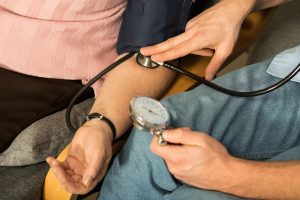 Prehypertension refers to blood pressure in a higher than normal range, but not high enough to be classified as hypertension. These slightly elevated numbers indicate a higher risk of hypertension. Both prehypertension and hypertension increase a person’s risk for cardiovascular events.
Prehypertension refers to blood pressure in a higher than normal range, but not high enough to be classified as hypertension. These slightly elevated numbers indicate a higher risk of hypertension. Both prehypertension and hypertension increase a person’s risk for cardiovascular events.
Prehypertension is defined as blood pressure readings of 120 to 139 over 80 to 89 mm Hg. If your doctor has diagnosed you with prehypertension, this does not necessarily mean that you will develop hypertension. In reality, your doctor is pointing out to you that you need to change your lifestyle in order to reduce your risk and start living a healthier life.
Prehypertension home remedies
Advertisement
Below you will find natural home remedies for prehypertension to reduce your risk of developing high blood pressure.
Herbs and spices: Basil, garlic, cardamom, cat’s claw, and celery seed can work to treat prehypertension.
Deep breathing exercises: A common cause for elevated or high blood pressure is stress, so deep breathing exercises can help reduce stress and, consequentially, your blood pressure. This is a natural way to help further reduce your blood pressure and keep your heart healthy.
Coconut water: Coconut water is high on the list of home remedies for elevated blood pressure. One of the causes for high blood pressure is an imbalance of electrolytes in the blood. Because coconut water contains an adequate supply of minerals and salts, it can help counter this imbalance.
DASH diet: The DASH diet focuses on high consumption of fruits and vegetables, and low fat intake, which can all aid in healthy blood pressure numbers.
Pears: A new study has revealed that the daily consumption of fresh pears can help improve blood pressure numbers and vascular function, as well as prevent type 2 diabetes and other cardiovascular diseases in middle-aged men and women.
Potassium: Because the typical American diet is high in sodium, it can lead to potassium deficiencies. High sodium has been linked to high blood pressure as well. Therefore, to combat the effects of sodium, it’s essential to get in adequate amounts of potassium.
Reduced salt intake: If you are over 40 or have a family history of high blood pressure, limit your salt intake to about 1,500 mg a day.
Reduced sugar intake: Sugar (including the sugar that’s processed from starchy food) plays a key role in atherosclerosis, a condition where a gooey sticky material collects along the walls of the arteries, makes the arteries narrow, and increases the pressure. Sugar also causes the insulin levels in the blood to shoot up. Elevated insulin is associated with increased triglycerides, increased bad cholesterol, diabetes, and high blood pressure.
Reduced caffeine intake: If your blood pressure increases by five to 10 points, you may be sensitive to the blood pressure-raising effects of caffeine, and it might be a good idea to gradually discontinue it from your daily diet.
Weight loss: In nearly all cases, high blood pressure is reduced or eliminated with unwanted weight. Keep an eye on your waistline. Carrying too much weight around your waist can put you at greater risk of high blood pressure.
Exercise: Now you don’t have to join a health club or start grunting in the weight room. Even moderate walking is great. Try taking the stairs instead of the escalator.
Advertisement
Limited alcohol and no smoking: In small amounts, alcohol can potentially lower your blood pressure by two to four mm Hg. But if you take more than one drink a day (350 ml of beer, 150 ml of wine, or 45 ml of 80-proof liquor), alcohol can actually raise blood pressure by several points. Tobacco hardens your arteries and the walls of your blood vessels and reduces the space in your arteries, so the pressure increases.
Stress reduction: Prolonged periods of stress is dangerous. Don’t let things affect you too much. If you can’t eliminate all of your stressors, try different things like yoga or meditation.
These are just some elevated blood pressure remedies you can begin to incorporate into your healthy living lifestyle in order to reduce your blood pressure and steer clear of the path to hypertension.
